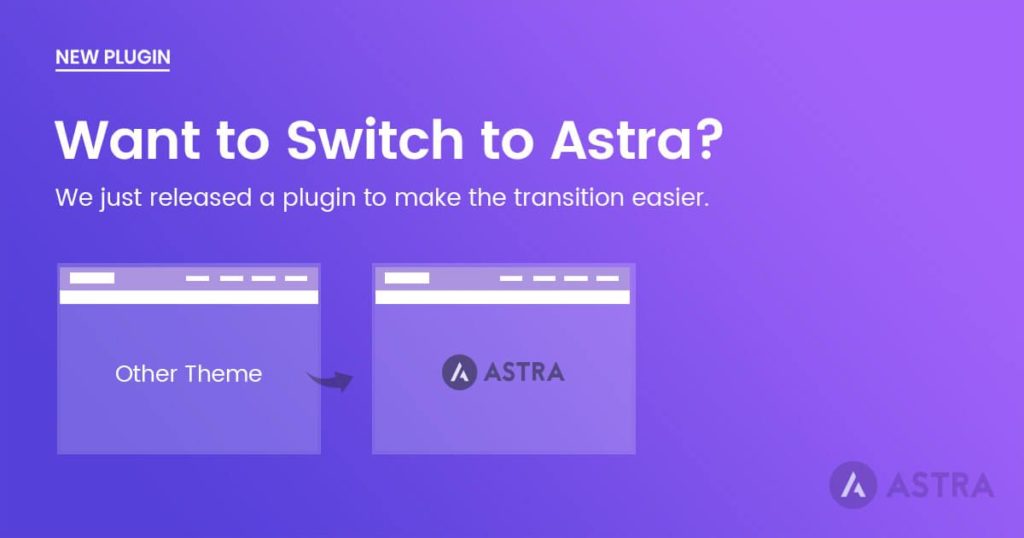As an entrepreneur, you’ll spend much of your time learning new skills and improving the ones you already have to continue, advancing professionally and growing your business.
The skills that you are probably constantly improving are those related to WordPress.
Whether you’re a web developer, a graphic designer, or WordPress user, there are always opportunities to monetize your skills, generate new income streams, and increase your revenue.
Or you may simply be looking for a career change.
In any case, in this guide you’ll see 12 ways to monetize your WordPress skills.
A couple of starting tips
There are many people and companies that stay in business because of WordPress.
Brainstormforce is one of those. We offer products and solutions for WordPress such as a theme used by more than 1 million sites, templates to design faster, or plugins that will add extra marketing and SEO (Search Engine Optimization) capabilities to your site.
If you want to leverage your WordPress knowledge to open up new opportunities, here are some quick tips so you don’t have to struggle to earn what you’re worth.
Go niche
According to W3Techs, up to 43% of all websites on the web run on WordPress.
With so many sites using the platform, the demand for WordPress-related jobs is enormous, but so is the competition.
If you want to work more comfortably, have an easier time marketing, and charge better rates, one of the best things you can do is to specialize.
Work with a specific framework, theme, or tool; for a specific market, or solve a unique problem.
Or combine them all.
Don’t be a “WordPress designer”, create teaching platforms for healthcare professionals using LearnDash and BuddyBoss.
Become a trusted source
Monetizing your skills means there will be someone on the other side paying you for it. They will be willing to put an important part of their business (or their hopes and dreams) in your hands.
Even if you specialize in a particular niche, you still have to work on becoming trustworthy.
You can capture and share testimonials from former clients, and collaborate in blogs, podcasts, talks and events related to the topic for which you want to position yourself.
The most important thing here is that you share everything you know. This is the fastest way to build trust and position yourself as an expert.
How to earn money with your WordPress skills
There are several ways to turn your WordPress expertise into a business model.
Here you’ll see which are the most recommended alternatives, and their main advantages and disadvantages.
1. Sell your knowledge
If you’ve been putting knowledge about WordPress into your brain for a long time, one of the easiest ways to get money out of it is to simply get that knowledge out.
You have several ways to do this.
WordPress Consultant
Offering your expertise on a consulting basis is a very quick way to monetize your WordPress skills.
This is a typical role that you’ve probably seen in other businesses. For example, a financial consultant who charges a fee to explain to you how to manage your savings.
It’s important to emphasize that you aren’t doing fieldwork, but guiding your client, usually to make a decision.
If you are a WordPress expert in LMS (Learning Management Systems), you could have one hour of consulting with a client to help them decide if it’s better to use LearnDash, MemberPress, or Teachable.
If you have specialized in solving one type of problem in a specific market, this is a job that will be very easy for you to do.
Don’t forget to offer consulting packs (1, 5 or 10-hour packs…), different communication channels (video call with screen sharing, phone call, email…) and extra content (an email or PDF summary, call recordings, a follow-up…)
Pros of being a WordPress consultant:
- Easy to start and run: You just need a communication tool like Zoom. You could even offer consultation by email.
- It’s the fastest and safest method of earning money: You can offer immediate value, and get paid instantly if you lock your booking method behind a payment gateway.
Cons of being a WordPress consultant:
- Time-dependent: You’ll get paid only by the time you work.
- Difficult to escalate: Your time is limited, and it can be complex to raise your rates if your brand is not strong enough.
Recommended tools and resources: If you want to start a WordPress consultation business, here are some tools that might make your job easier.
- Communication tools: Zoom, Google Meet, or Skype for video calls, or your favorite email management software.
- Booking system: If you want to automate the process, you can try Calendly.
Example: Chris Lema offers coaching services on his website.

WordPress events
If you become an authority on WordPress, you’ll probably be invited to give talks online or on stage, and even get paid for it.
Otherwise, you will have to make the extra effort to find those events or even create your own.
In any case, in addition to sharing your knowledge, you will be also sharing your personal experience, which makes this alternative even more unique.
Attending events is an interesting option when coming to grow your personal brand, which would help you to increase your private consulting fees.
Pros of attending WordPress events:
- You can create a signature presentation and continually reuse and improve it without having to create something new from scratch each time.
- The profit obtained for this type of work is usually quite high.
Cons attending WordPress events:
- It’s difficult to maintain a constant flow of events, especially if you are just starting out.
- If the events are physical, you’ll have to invest much more time and energy than just the duration of your talk.
Recommended tools and resources: If you are invited to an online event, you will have to use the tool provided by the host.
Otherwise:
- If you want to create your own event, a tool like Eventbrite will be a must for you to be able to sell and manage tickets.
- 12 best WordPress themes for events and conferences.
- A guide on how to organize digital events
Example: Pat Flynn offers keynote speeches as a service:
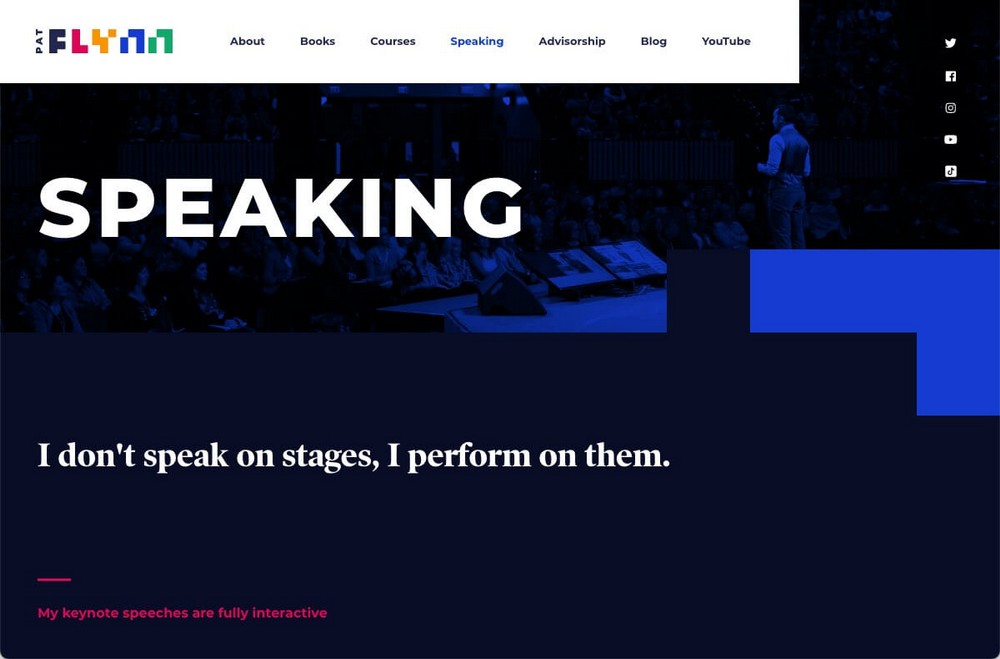
But he has also created his own event called FlynnCon!

Extra: WordCamp: A conference that focuses on everything WordPress.
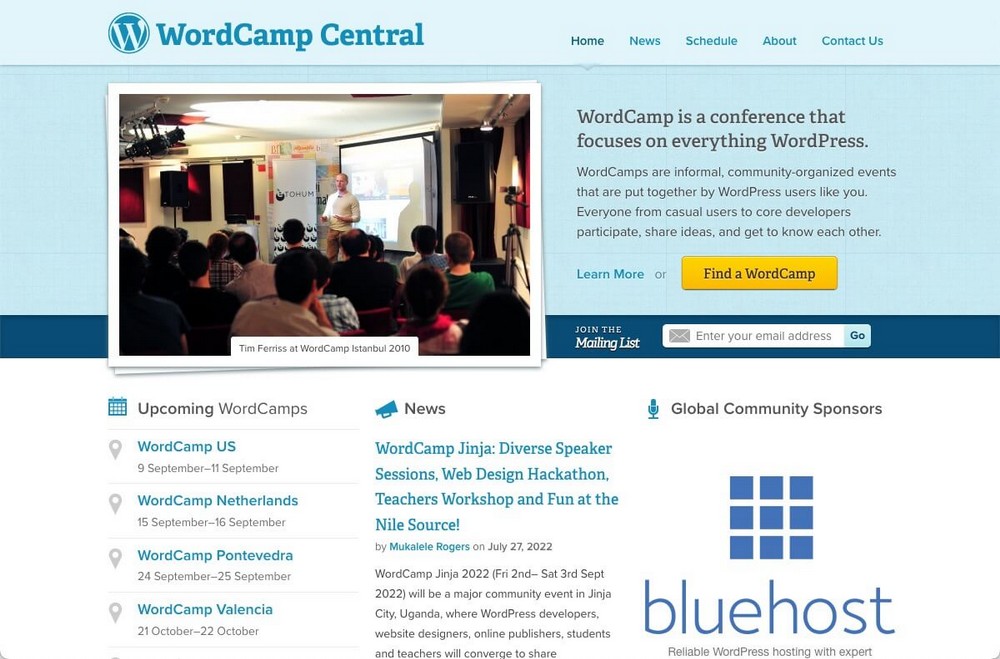
Live lectures and workshops
This method of skill monetization is quite similar to consulting. In this case, you won’t solve a specific problem for a client, but offer a masterclass on a specific topic.
Like:
- “How to create an online course using LearnDash”
- “WordPress security, how to create an impenetrable website”
You won’t be offering your expertise as an opinion (e.g. which plugin to use), but you’ll be explaining how to achieve something specific.
This is a very comfortable way of working, since you will be teaching something you will have prepared in advance.
If you promote it correctly, your customers will be happy because they will know exactly what they are going to learn.
Pros of live lectures and workshops:
- More revenue potential: You can serve many more clients than in traditional 1-to-1 coaching sessions.
- You can reuse the content for future classes, or sell the recordings as a product.
Cons of live lectures and workshops:
- You need a slightly larger audience than when offering private coaching: Not everyone will be interested in the topic you choose to teach or will be available to attend.
- Technically, it’s a bit more complex to set up. And you will probably have to make a small investment in software.
Recommended tools and resources: The easiest way to teach live and online to a group of people is through a webinar.
- Webinar tools: Zoom, Zoho Meeting, WebinarJam, WebinarNinja, ClickMeeting, WebinarPress…
- How to host paid webinars
Example: If you want to see a never-ending list of paid webinars, you can go to Eventbrite and filter events as online, paid, class/seminar categories.
Here’s for instance an example of a paid webinar on how to sell products using stop-motion technique, by Alice Loveday.
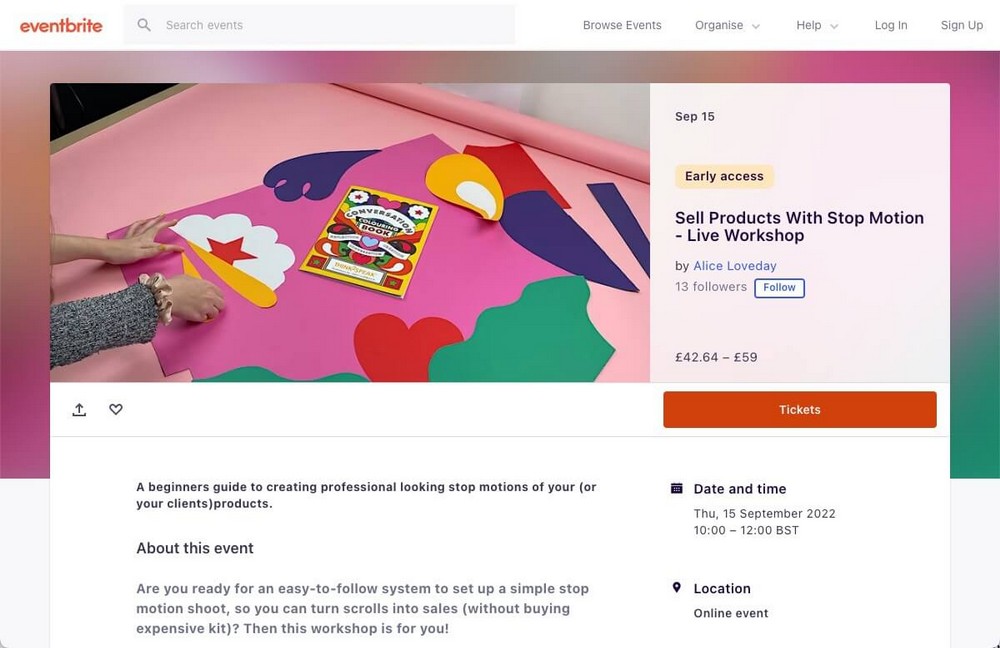
Online courses
Online courses have been one of the most popular forms of knowledge monetization for several years now.
Demand grows continuously and profits can be astronomical (without depending directly on your time).
But they are one of the most difficult options to master.
Creating a course from scratch takes time, a lot of time, and once you’ve finished it, you’re not even halfway done.
Creating online courses is divided into 50% content creation and 50% marketing (at least).
It’s true that the other alternatives on this list also require some marketing. But, in the case of online courses, the required effort is greater, competition is fierce, and there are already major players on the scene.
Even Richard Branson is teaching online.
Offer 1-on-1 coaching sessions and create small live workshops. When you have a good understanding of what your clients’ needs are, you can create an online course to help solve them.
Pros of creating WordPress-related online courses:
- Huge revenue potential: A good course can be priced at hundreds or even thousands of dollars. It can then be sold to hundreds or thousands of people.
- A quality course will create a loyal customer community.
Cons of creating WordPress-related online courses:
- A bit risky: You’ll need to put a lot of time and effort (and some money) to create the content, with no guaranteed return on the investment.
- It can be exhausting: Creating and selling an online course requires planning the content, recording it, editing it, publishing it, creating a very good landing page, sales funnels, offering continuous support to the students.
Recommended tools and resources: You’ll need several tools for launching your online course properly. Here are some of the basics:
- Hardware: At least a good microphone and a camera (you can start with your smartphone though!) You may need some extras to improve the quality of your media (a pop filter, a green screen, extra lights…)
- Recording and editing software: ScreenFlow (macOS) and Camtasia (macOS and Windows) are your best alternatives, especially if you also want to record your screen.
- A platform for uploading and distributing your content: You can create your own with LearnDash and WordPress, or use Teachable, Kajabi or Udemy.
- Optional but recommended: Marketing tools like CartFlows and email marketing software (Active Campaign, Mailchimp, Drip).
- How to build an online course website with WordPress.
Example: There are thousands of examples of people monetizing their skills by selling online courses, not only about WordPress, but of any topic.
In this course, Matt Kepnes, the founder of Nomadic Matt, teaches you how to create a successful blog:
Books
Books don’t usually have the same eye-catching benefits as online courses, at least the self-published ones. But they are also a great way to monetize your knowledge.
Book-reading audiences tend to be very loyal and pay attention to the content. That makes this a good way to pre-qualify leads, and refer them to other products and services you offer.
In addition, no one expects the content of a book to be updated, nor to receive support if they have specific questions.
Pros of books:
- You can publish your book on many platforms, with thousands of clients already looking to buy and consume content.
- A book will skyrocket your branding as long as it sells.
Cons of books:
- You need some technical knowledge to design a book properly, although this is something that can be outsourced.
- Publishing a book also involves quite a bit of work and can be overwhelming.
Recommended tools and resources: Although you will also have to make some investments in order to create your book, you will need far fewer resources compared to creating a course.
- Writing Software: Word, Pages, or specific apps like Scrivener or Vellum.
- Optional: marketplaces to outsource some parts of the process (such as the cover design) 99Designs, Fiverr, Upwork.
- Where to publish: Amazon, Apple Books, Google Play Books, Kobo… You can also sell directly on your blog using Gumroad.
- Kindlepreneur
Example: Meera Kothand has published several books talking about blogging and marketing.
This helps her not only to monetize her knowledge but also to find new customers for her other products.

Fan-supported monetization or fan funding
Fan-supported monetization is where you monetize your work partly thanks to your content, and partly thanks to donations from your fans who don’t even expect content or great value in return.
This is similar to the creation of membership sites. Only in this case, it will not be 100% focused on selling your knowledge, but you’ll also be able to offer other perks.
You can simply offer badges on the comments on your blog or YouTube channel, priority access to content, images and more personal “behind the scenes” stories.
Although you can also lock content and make it available only to your supporters, as a traditional membership site.
Pros of fan-supported monetization:
- Less focus on marketing and more on content creation, which is probably what you like and are good at.
- You will create a community of fans, not customers, which is a very good thing.
Cons of fan-supported monetization:
- You need a large audience for revenue to support your lifestyle.
- It can affect your personal brand and make people think you don’t have a solid business model.
Recommended tools and resources: creating a fan community is not much different from creating a membership site.
- Patreon is the way to go when talking about fan-supported monetization. Although you could also create your own platform with WordPress and some membership plugins.
- How to use Patreon to crowdfund your WordPress content
Example: Dylan Bates, from “The Final Cut Bro” YouTube Channel, offers a small membership plan. It gives you early access to bonuses and tutorials, a personal thank you in each video and discounts on his products.
As you can see, not all are related to their skills (in this case video editing) but it’s another way to monetize them.
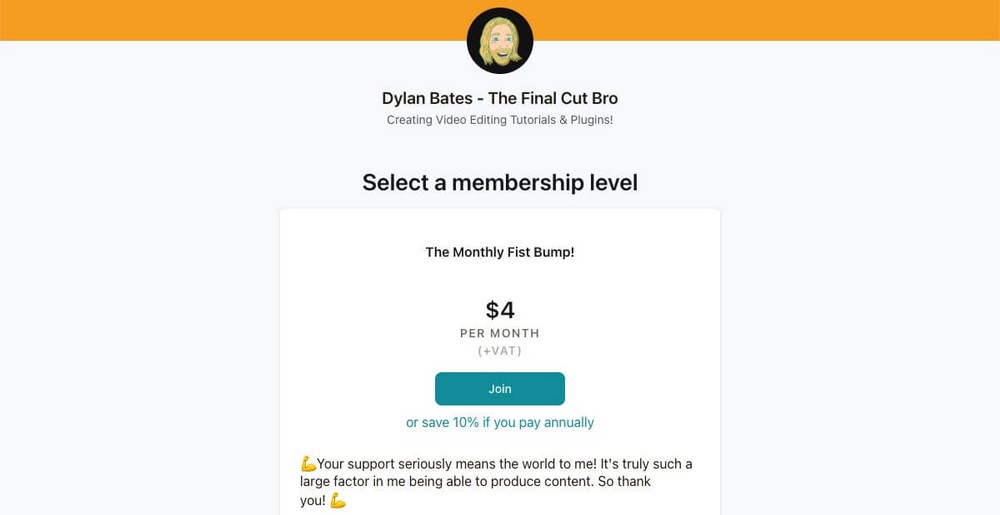
2. Create WordPress-related products
WordPress has a huge community behind it, and being open source software means that it allows the possibility of creating many addons for it.
Themes
Everyone needs a professional online presence to create a great first impression..
Selling a WordPress theme is a way to create recurring income from a single effort. You will need to keep the theme updated and offer improvements over the long term though.
Pros of theme creation:
- Easy-to-maintain product, especially if you only sell design and no extra features.
- Recurring income, one product, many sales.
Cons of theme creation:
- Tons of competition, it’s difficult to stand out.
- In addition to design, you also need other technical skills.Many themes offer extra functionalities which you will have to provide.
Recommended tools and resources: If you are a designer, you probably already have a CSS editor, so you’ll only need the sales platform for your product.
- You can sell your themes on ThemeForest, UI8, Template Monster.
- How to create a WordPress child theme, step-by-step guide
Example: This time you won’t have to go far to see a company monetizing their WordPress skills. Our own Astra WordPress theme is our star product.
If you visit a marketplace like Themeforest, you will find thousands more examples.

Templates
If creating a WordPress theme completely from scratch is beyond your abilities, there is the possibility of simply creating small templates. They can be used with website builders like Elementor, Beaver Builder, or Gutemberg’s editor.
For example, you could create a template of a sales page that, in addition to the design, would guide the user in the parts to be filled in (intro, reviews, FAQs, call to action, guarantee and so on).
Pros of template creation:
- Templates are much easier to create than a complete theme from scratch.
- You can create packs to provide more attractive offers.
Cons of template creation:
- You will depend on third-party website builder tools (Beaver Builder, Elementor…).
- Modest earning potential.
Recommended tools and resources: The easiest way to create templates is to export them from website builders.
- Create and save a custom layout template with Beaver Builder
- How to save, import and export templates in Elementor
Examples: In addition to the Astra theme, Brainstorm Force also has numerous templates that you can quickly adapt to your needs.
- Elementor widgets, templates, and blocks
- Ultimate Addons for Beaver Builder
- Spectra
- Starter Templates
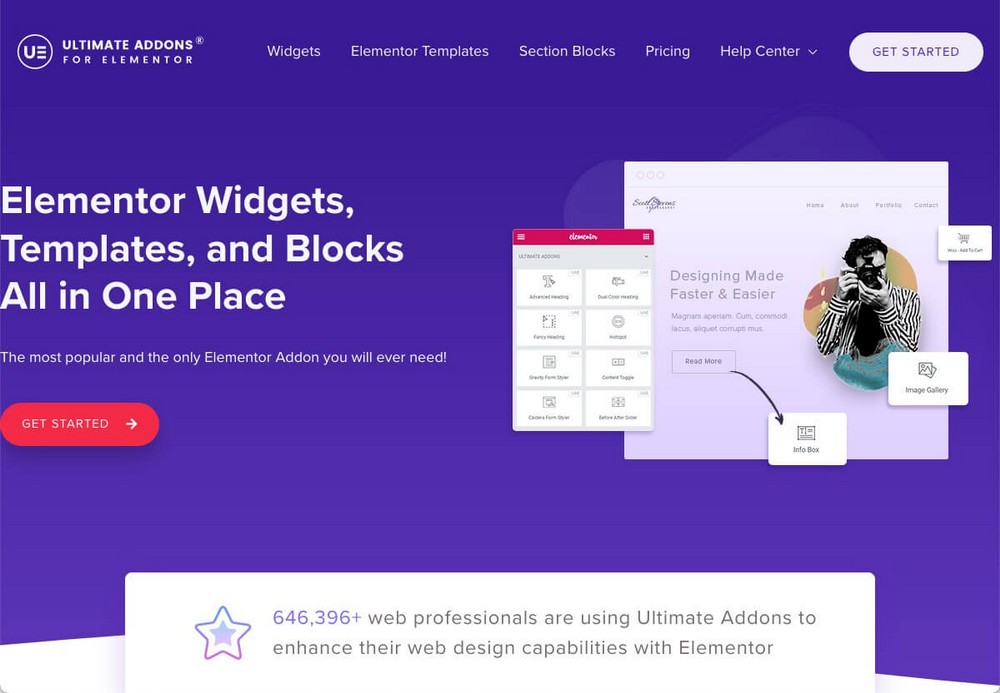
Plugins
Creating WordPress plugins can be one of the most lucrative options when it comes to monetizing your WordPress skills. Like themes, they are often associated with a recurring (annual) payment to receive updates.
The best thing about this option is that you cannot only develop plugins that add extra features to WordPress, but also to other plugins!
You’ll find for instance several plugins that enhance the basic capabilities of WooCommerce.
Pros of plugin creation:
- Easier marketing, since you can create a free version in the WordPress repository to serve as a lead magnet.
- High earnings potential.
Cons of plugin creation:
- Needs a lot of maintenance: you need to add new features on a frequent basis, release security updates, and include compatibility with latest WordPress versions.
- You need to be skilled in programming to create a good plugin.
Recommended tools and resources: If you want to start developing WordPress plugins, the best way to do it if start with some official documentation:
Example: Florian developed a WordPress plugin called AAWP (Amazon Affiliate for WordPress) to make it easier for writers to include Amazon affiliate links in their articles.

Scripts
You can consider a script as the small version of a plugin which solves a very specific problem. A small piece of code that your customers can include in their posts or pages.
Pros of scripts creation:
- If you have the knowledge, you can create many scripts quickly.
- Requires less maintenance.
Cons of scripts creation:
- Hard to sell: There may be many online communities sharing the same or a very similar solution free of charge.
- Low earnings potential.
Recommended tools and resources: Besides creating the script, you’ll probably need to explain to your customers how to use it in their WordPress installations:
Example: Brad Dalton has a site where he shares scripts to customize your Genesis, WooCommerce and WordPress theme.
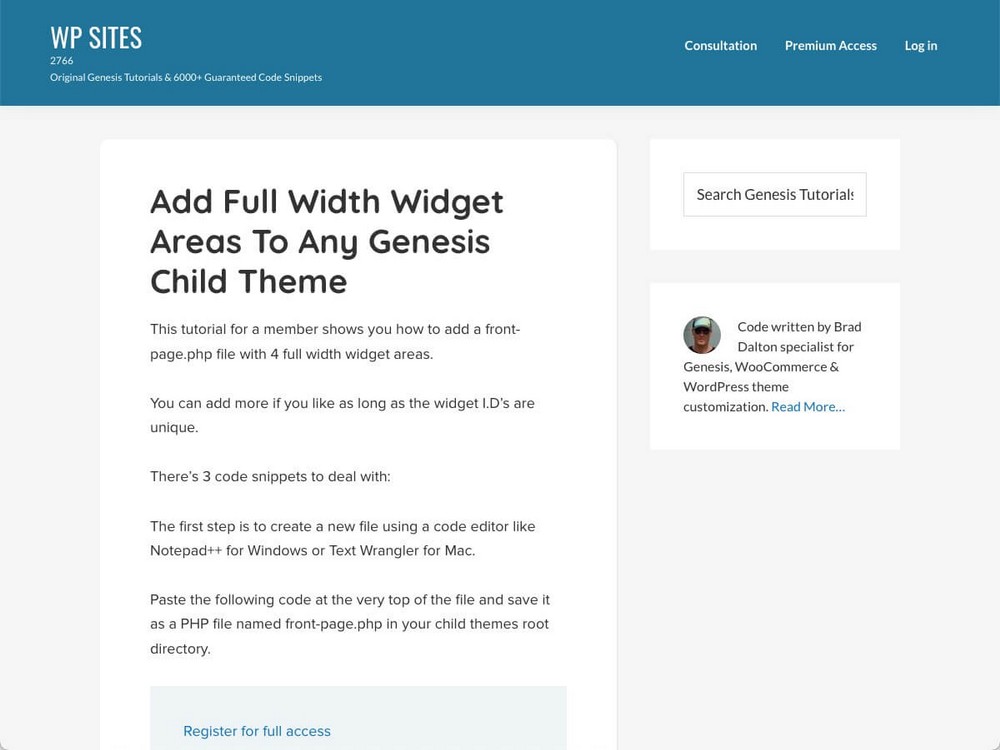
3. Sell services
Instead of selling your knowledge and teaching your customers how to do something, you can offer to perform those tasks for them.
Depending on your area of expertise, there are several types of WordPress services you can offer:
- Design custom websites for business (or redesign them).
- Develop custom plugins, scripts or tools for solving a very specific problem.
- Offer technical support: As a one-time job (recovering the backup of a website) or as a recurring job (web maintenance program)
- Implement a WordPress site: For example, create simple websites by using a theme, a website builder, and configuring some basic plugins.
Pros of selling services:
- Easy to start, you don’t need to invest a lot of effort or money upfront.
- Opportunity to get recurring income.
Cons of selling services:
- Not scalable: Although if you work by results instead of billing time, it can be profitable (for example, recovering a website after a hacking).
- Working with customers requires a lot of communication time.
Recommended tools and resources: Always check the careers section of your favorite companies. It’s very likely that they have WordPress-related opportunities, as is the case with Brainstorm Force.
Otherwise, check the typical freelance marketplaces to find new clients:
Example: Tom Hirst is a senior WordPress developer. You can hire him for your projects, which must start at the $6,000 mark.

4. Create your own projects and monetize them:
If you know how to create WordPress websites, one of the best things you can do is to create your own website, and start monetizing it.
This website doesn’t have to be about WordPress, it can be about whatever topic you are most interested in, or think will be most profitable.
This website (or websites) will not only serve you to potentially earn money, but also as a testing ground to experiment, and keep improving your skills.
Pros of monetizing your projects:
- A lot of freedom to experiment. You will be able to be more creative and do things you wouldn’t do on a client’s project.
- If a project ranks well, it can offer a recurring income with no extra effort on your part.
Cons of monetizing your projects:
- It will take quite some time before you start to see results.
- The project can fail and not give you any return on the investment.
Recommended tools and resources: There are many ways of making money with a blog, so you will need different resources for each one of them:
- Display Ads: Mediavine, AdThrive, TheMoneytizer…
- Affiliate programs
- Selling Products with WooCommerce.
- Sponsors: how to get sponsored.
- Rank and rent: Rank a website as a local business, and then rent it to local service providers. Beginner guide to rank and rent.
- Flip sites (create/buy, improve and sell): Flippa, Motion Invest, Empire Flippers…
Example: Spencer Haws from Niche Pursuits has been creating WordPress websites of all kinds for almost a decade and monetizing them through methods like the ones you just saw above.
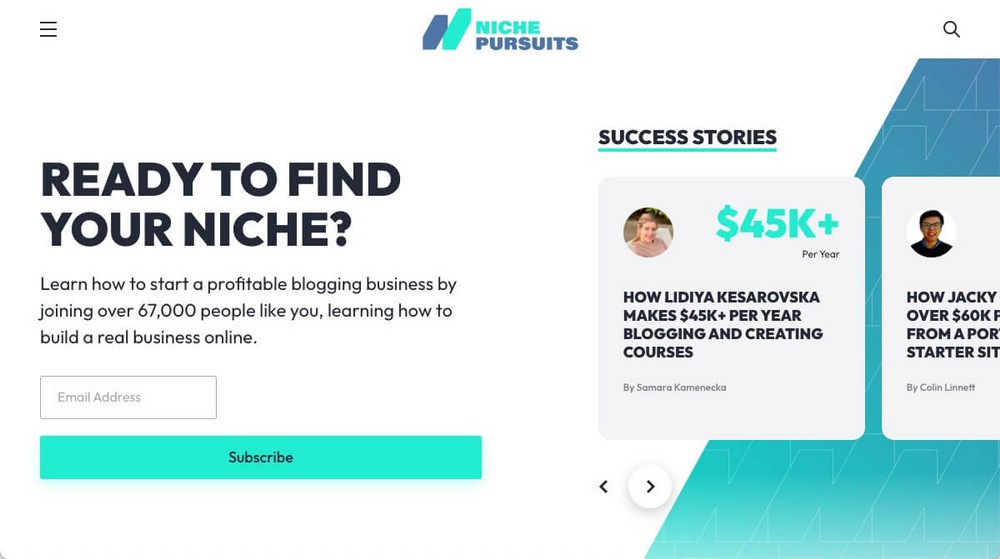
Final thoughts on monetizing your WordPress Skills
As you have seen, there are a multitude of options when it comes to monetizing your WordPress knowledge and skills.
Although you can focus on one, the most interesting thing would be to work on several of these options at the same time, creating a network of products that help each other grow.
- Create your own WordPress site and try to monetize it with ads or affiliates; buy websites, improve them with your skills, and resell them.
- Go to talks and conferences and explain how you have done it, or create a course or book that compiles your work methodology.
- Use all your experience and reputation to get good customers and offer them first-class services.
What is your favorite way to monetize your WordPress skills? Do you have any other money making ideas to share?
Tell us in the comments below!
Disclosure: This blog may contain affiliate links. If you make a purchase through one of these links, we may receive a small commission. Read disclosure. Rest assured that we only recommend products that we have personally used and believe will add value to our readers. Thanks for your support!


